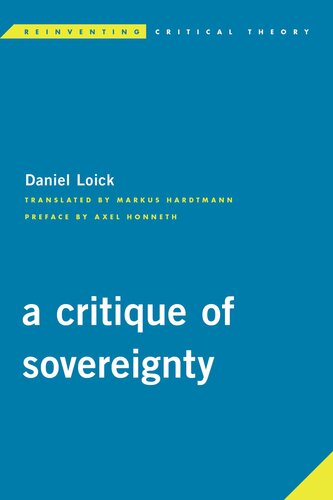

Most ebook files are in PDF format, so you can easily read them using various software such as Foxit Reader or directly on the Google Chrome browser.
Some ebook files are released by publishers in other formats such as .awz, .mobi, .epub, .fb2, etc. You may need to install specific software to read these formats on mobile/PC, such as Calibre.
Please read the tutorial at this link: https://ebookbell.com/faq
We offer FREE conversion to the popular formats you request; however, this may take some time. Therefore, right after payment, please email us, and we will try to provide the service as quickly as possible.
For some exceptional file formats or broken links (if any), please refrain from opening any disputes. Instead, email us first, and we will try to assist within a maximum of 6 hours.
EbookBell Team

5.0
38 reviews
ISBN 10: 1786600382
ISBN 13: 9781786600387
Author: Daniel Loick
In this important new book, Daniel Loick argues that in order to become sensible to the violence imbedded in our political routines, philosophy must question the current forms of political community – the ways in which it organizes and executes its decisions, in which it creates and interprets its laws – much more radically than before. It must become a critical theory of sovereignty and in doing so eliminate coercion from the law. The book opens with a historical reconstruction of the concept of sovereignty in Bodin, Hobbes, Rousseau, and Kant. Loick applies Adorno and Horkheimer’s notion of a ‘dialectic of Enlightenment’ to the political sphere, demonstrating that whenever humanity deemed itself progressing from chaos and despotism, it at the same time prolonged exactly the violent forms of interaction it wanted to rid itself from. He goes on to assemble critical theories of sovereignty, using Walter Benjamin’s distinction between ‘law-positing’ and ‘law-preserving’ violence as a terminological source, engaging with Marx, Arendt, Foucault, Agamben and Derrida, and adding several other dimensions of violence in order to draw a more complete picture. Finally, Loick proposes the idea of non-coercive law as a consequence of a critical theory of sovereignty. The translation of this work was funded by Geisteswissenschaften International – Translation Funding for Humanities and Social Sciences from Germany, a joint initiative of the Fritz Thyssen Foundation, the German Federal Foreign Office, the collecting society VG WORT and the Börsenverein des Deutschen Buchhandels (German Publisher & Booksellers Association)
I: Traditional Theories of Sovereignty
1. Order and Orientation: Primitive Usurpation (Jean Bodin)
1.1 What Is Sovereignty?
1.2 Competence-Competence and Limitation-Limitations
1.3 Peace through Violence
2. Binding and Blinding: The Rhetorics of Obligation (Thomas Hobbes)
2.1 Might Is Right
2.2 The State and Its Limits
2.3 The Ironic Justification of Power
3. Divide and Conquer: Autonomy as Heteronomy (Jean-Jacques Rousseau)
3.1 The Problème Fondamental and Its Solution
3.2 What Is Popular Sovereignty?
3.3 Forced Freedom
4. Internalise and Internationalise: Subordinate Sovereignty (Immanuel Kant)
4.1 The Human Right to the State
4.2 The Rule of Reason
4.3 Coercion and the End of Reason
5. Interim Conclusion: Ironies of the Political
Notes
II: Critical Theories of Sovereignty
1. The Critique of Law-Positing Violence (Karl Marx and Hannah Arendt)
1.1 The Dawn of Critical Sovereignty Theory: Karl Marx
1.2 Sovereignty as the Loss of Politics: Hannah Arendt
1.3 Marx and Arendt: A New Virtuosity of the Political
2. The Critique of Law-Preserving Violence (Walter Benjamin and Michel Foucault)
2.1 Critical Theory of the Police: Walter Benjamin
2.2 The Law of Sovereignty, the Mechanics of Discipline: Michel Foucault
2.3 Benjamin and Foucault: Politics beyond the State
3. The Critique of Law-Withholding Violence (Giorgio Agamben)
3.1 Exception and Exclusion
3.2 Exception and the External
3.3 Sovereignty and Latency
4. The Critique of Law-Interpreting Violence (Robert Cover and Jacques Derrida)
4.1 The Non-Opposition of Law and Violence in the Work of Robert Cover
4.2 Aporias of Decision in the Work of Jacques Derrida
4.3 The (Im)possibility of the Non Liquet
5. The Critique of Law-Splitting Violence (Feminist Critique of Sovereignty)
5.1 The Four Dimensions of the State’s Masculinism
5.2 Feminist Critique of Sovereignty: Abortion, Bio-Politics and Omnicompetence
5.3 Post-Masculine Politics in the World of Sovereignty
Excursus: Law-Replacing Violence (Problems of Passage)
Notes
III: Critical Theory without Sovereignty
1. Law without Coercion (Hermann Cohen)
2. Commandment without the State (Franz Rosenzweig)
3. Participation and Dissidence: Consequences of a Critical Theory of/without Sovereignty
Notes
IV: Literature
1. Abbreviations
2. Further Literature
critique of sovereignty
what is sovereignty and an example
theory of sovereignty example
theocracy sovereignty
a critique of violence
what is sovereignty why is it important
sovereignty crash course
Tags: Daniel Loick, Critique, Sovereignty